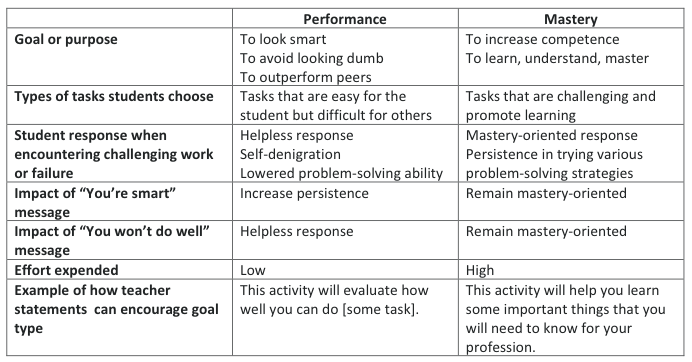When most people talk about “goal orientation” they generally mean “how motivated are you to achieve your goals?” While this question may be fine for most people, I don’t think it helps most Secret Entourage readers. Reflecting on HOW motivated you are to achieve something may in fact actually lessen your drive (I’ll explain why in a future article). So if you’re going to do some soul-searching, spend your time taking a sober look at WHAT motivates you. This is precisely what psychologist Carol Dweck had in mind when she conducted her research on school children in the late 1970s.
Two 10-year old boys enter separate classrooms. The rooms look exactly like what you’d imagine, typical elementary school classrooms from the late 70’s. Lots of small tables and chairs, lots of student projects, and a general almost overwhelming sense of color. In most ways the rooms are completely identical. The boys are fairly identical too, which is great for Dweck’s research. The tests these boys were given were straightforward. Each boy was given a series of progressively difficult problems. As the difficultly rose, each boy is asked if he would like a more difficult problem or an easier problem. The results of this research show that the two boys had very different reactions to this kind of experiment. The first boy, continued to enjoy the challenge of the difficult problems and remained engaged and confident. This boy was exhibiting what psychologists now call a “learning orientation” or “mastery orientation.” In contrast, the second boy became disinterested and upset as the difficultly of the problems rose; his principal goal was to demonstrate and validate his competence. The second boy has what researchers now call a “performance orientation.”
Since that time, organizational and school psychologists have been doing lots and lots of research to better understand how these two orientations interact and how they may determine an individual’s success in different environments. This chart clearly shows some of the differences:
So, no more descriptions. What does all of this mean for you? Well, first you need to determine which one of these boys seem most similar to you. Do you like to demonstrate you expertise by accumulating achievements or do you prefer to challenge yourself for even if you get in over your head? In general, are you more motivated to master skills or to master others? Understanding where you are is important because it shows you where you may need to grow. In fact, researchers now believe that these orientations, while pronounced and distinct in children, may become complementary in adults. That is, while children may be labeled high in learning orientation OR high in performance orientation, adults may score high on performance orientation AND learning orientation. In this way, you’ll want to build up these motivating forces simultaneously and avoid letting one dominate your life.
Remember, if you want to succeed then you’re going to have to learn your own weaknesses and temptations (see “Manage Your Temptations”). If you’re completely performance oriented then you may avoid important learning situations in which you may appear incompetent. Conversely, if you’re completely learning oriented you may leave many projects unfinished because the novelty of the challenge has worn off. The key is to know yourself and know when you are just making excuses.
You want a real success secret? Understand this principle: achievement without mastery is temporary; mastery without achievement is delusion.
About the author: Chris Cowan is an executive coach and an expert in adult and organizational learning. He is currently working as a consultant with the Federal government. He has previously worked for the Department of Health and Human Services’ Center for Leadership Development and the George Washington University’s Graduate School of Education and Human Development. Previous consulting clients include, Fannie Mae, Samsung USA, the United States Air Force, and Microsoft. He has written or co-authored 13 articles on adult learning and is a certified action learning coach and training evaluator. Chris received his Masters from Harvard in 2005 and is currently writing his dissertation on transformational leadership at the George Washington University. He currently drives a 2008 Dodge Viper. Feel free to contact him with questions at Chrcowan@gmail.com.

